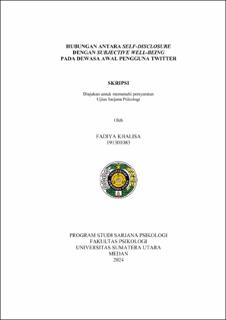| dc.contributor.advisor | Tuapattinaja, Josetta Maria Remila | |
| dc.contributor.author | Khalisa, Fadiya | |
| dc.date.accessioned | 2025-01-30T03:59:27Z | |
| dc.date.available | 2025-01-30T03:59:27Z | |
| dc.date.issued | 2024 | |
| dc.identifier.uri | https://repositori.usu.ac.id/handle/123456789/100659 | |
| dc.description.abstract | This research aims to determine whether there is a relationship between self-disclosure and subjective well-being in early adult. Disclosing on social media not only as a way to express themselves, but also to create friendships and get social support. Having good friendships can improve subjective well-being due to the relief from expressing themselves and fulfilling the needs to socialize. This study uses a quantitative correlational method with a purposive sampling technique. The number of subjects in this study was 350 respondents (x̄ = 21.4 SD = 2.05) Twitter users aged 18-30 years. The research data were taken using a likert-scale questionnaire consisting of Self-Disclosure scale to measure self-disclosure, Satisfaction with Life Scale that adapted from Akhtar (2019) and Scale of Positive and Negative Experience by Diener (2009) to measure subjective well-being. Based on the Pearson's Product Moment correlation test conducted, the results of this study showed that there was no relationship between self-disclosure and subjective well-being in early adult Twitter users with a p value of .607 and a correlation coefficient value of r (350) of -.028. This means that levels of self-disclosure that carried out by early adult Twitter users are not related to the levels of subjective well-being. | en_US |
| dc.language.iso | id | en_US |
| dc.publisher | Universitas Sumatera Utara | en_US |
| dc.subject | Early Adulthood | en_US |
| dc.subject | Self-Disclosure | en_US |
| dc.subject | Subjective Well-Being | en_US |
| dc.title | Hubungan antara Self-Disclosure dengan Subjective Well-Being pada Dewasa Awal Pengguna Twitter | en_US |
| dc.title.alternative | The Relationship between Self-Disclosure and Subjective Well-Being in Early Adulthood Twitter Users | en_US |
| dc.type | Thesis | en_US |
| dc.identifier.nim | NIM191301083 | |
| dc.identifier.nidn | NIDN0030126202 | |
| dc.identifier.kodeprodi | KODEPRODI73201#Psikologi | |
| dc.description.pages | 110 Pages | en_US |
| dc.description.type | Skripsi Sarjana | en_US |
| dc.subject.sdgs | SDGs 4. Quality Education | en_US |


